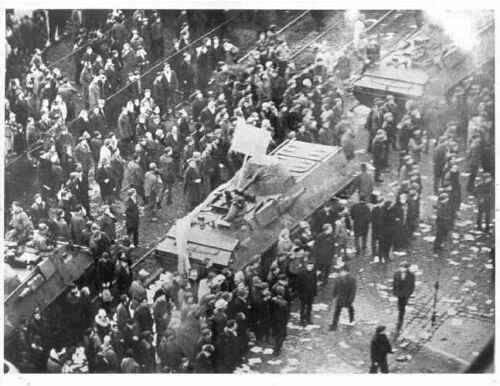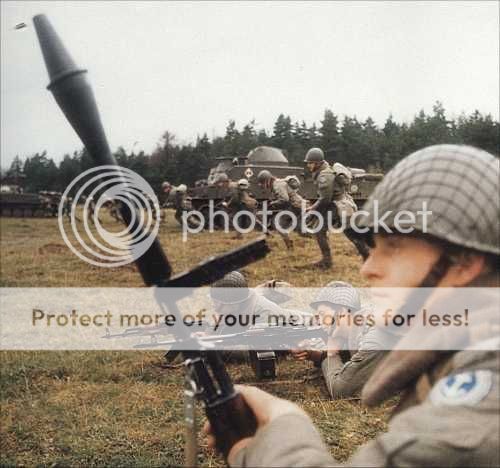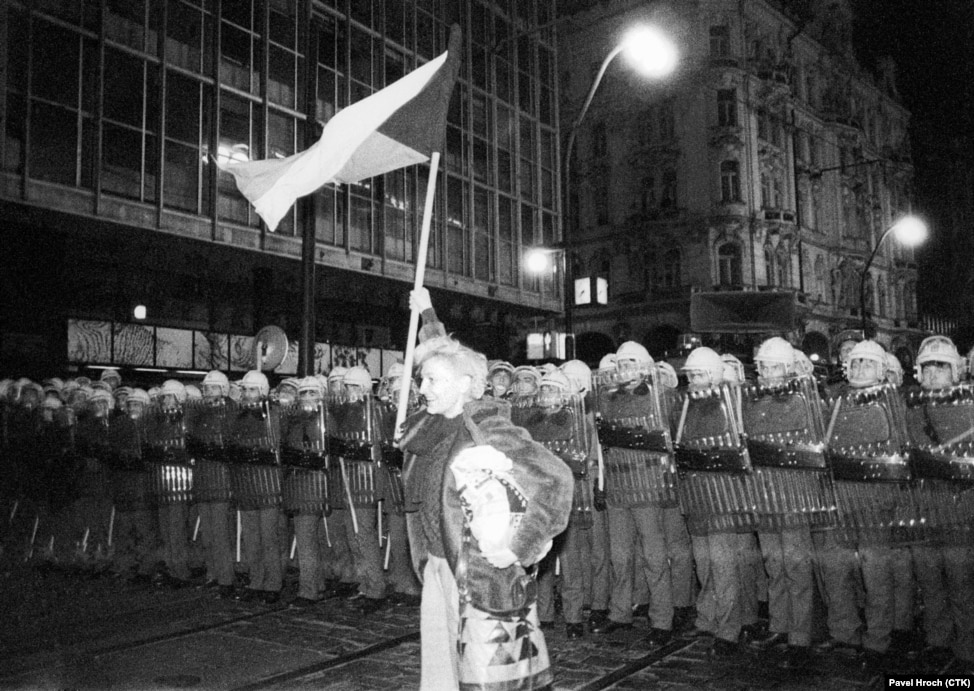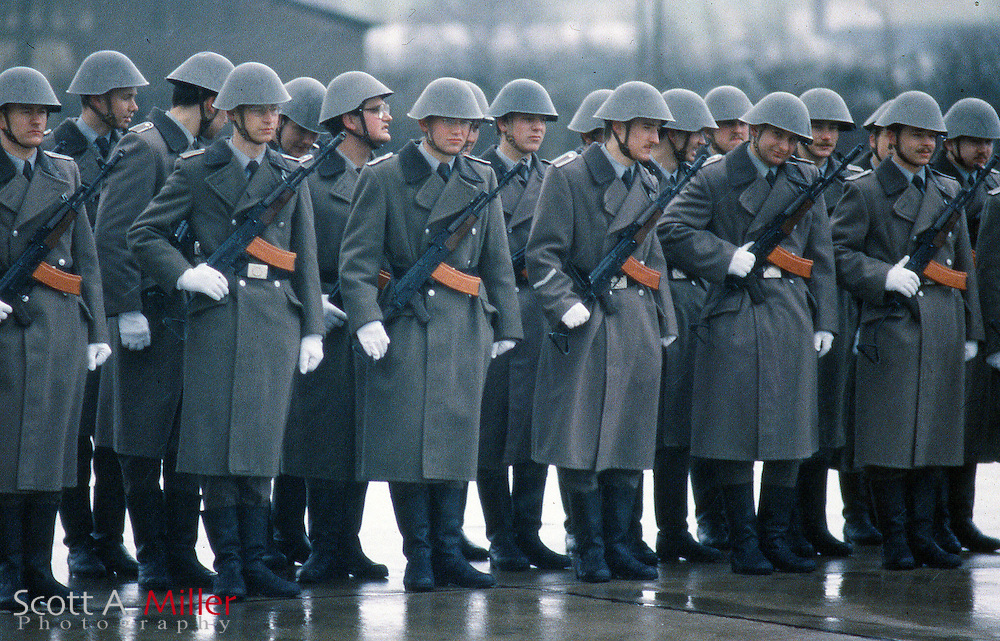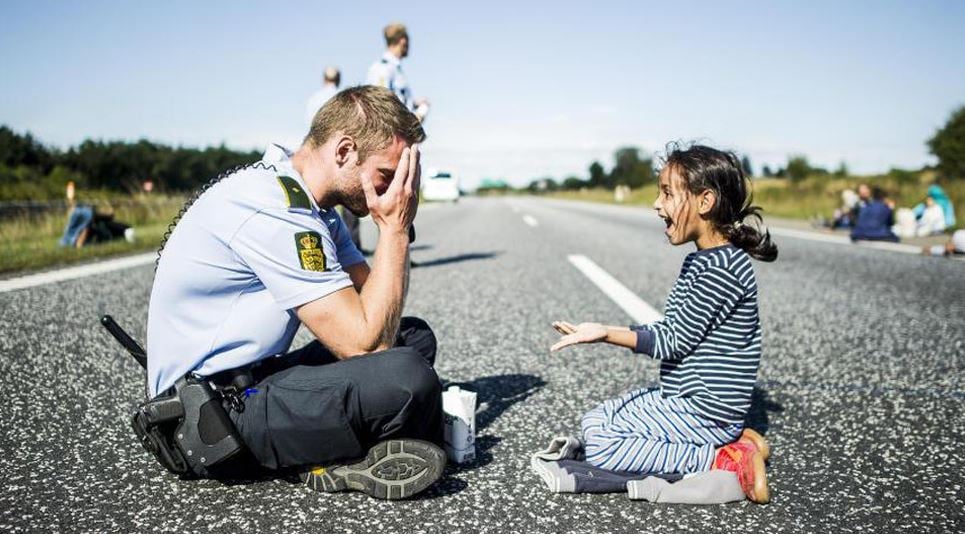Chapter 6, Part 2: A Storm Breaks Out in Europe
Mid-day, November 25, 1989
Outside the Sejm, Warsaw, Poland
“Poland is the home of a great and nationally conscious people”
-Adolf Hitler
Members of the Soviet Army were taking cover behind a burning T-72 tank, shielding themselves from the return fire from their Polish “allies.” When given the orders to shoot and clear the several of thousands protesters camped outside the Polish Sejm (Senate in Polish), the Polish army turned their guns on their “comrades” in the Red Army. Now these Soviet soldiers, most of them young conscripts experiencing combat for the first time, were trying to hold back the surging Polish forces which were being cheered on by the protesters they were now defending.
All across Poland and indeed the whole of the Eastern Bloc, Soviet soldiers found that the soldiers that there were here to “aid” in suppressing their fellow countrymen, were now violently mutinying, joining the revolutionaries to fight the Soviet intervention in their country. Stretched thin in many places, Soviet soldiers and the few local units that remained loyal to them were forced to fall back. In many other cases they had to resort to attacks by helicopter gunships and Su-25s in order to disperse ad hoc armed groups which were ferociously fighting back. Already it was believed that hundreds had perished in the first day of fighting in Eastern Europe.
Over the coming months, there would be plenty more as Eastern Europe became the charnel house of the world.
^
Polish demonstrators carry one of their wounded to safetey. There are already reports of mass bloodshed, with fatalities allegedly numbering in the hundreds.
^
Demonstrators courageously confront Soviet tanks. Such scenes are presently playing out across the breadth and width of Eastern Europe.
^
Polish troops pictured in military exercises. Already a significant swath of the Polish army has mutinied and are fighting the Soviets.
Afternoon, November 25, 1989
A Farmhouse, 20 miles from Warsaw, Poland
Walesa emerged from the hiding hole that had been cut into the floor, years before by the resident of this farmhouse. Knowing that he was entirely, at the mercy of these kind strangers who had agreed to hid him in their home, Walesa couldn’t begin to thank them.
Earlier in the day, as it became clear the Soviet government was moving to forcibly restore the old Communist system, Walesa realized that if he was captured or killed, then the spirit of the Polish people could be broken by the invading Soviets. Obeying the advice of his trusted friend and political ally, Michnik, Walesa agreed to hide with some of Michnik’s rural friends so that he could have a chance of surviving in order to proceed lay the groundwork for a guerilla war.
The Electrician turned Statesman now found himself thrust into a new role. Partisan leader. Fortunately, he had been able to procure a copy of Mao’s On Guerrilla Warfare. He would be have little to do as he waited for the storm hitting his nation to clear.
^
Lech Walesa, leader of the anti-communist Solidarity. His exact whereabouts are presently unknown. However, Solidarity's western contacts have been informed that he in a "safe location" from which "he will carry on the struggle to liberate our Polish homeland."
Evening, November 25, 1989
President’s Office, Warsaw, Poland
As Wladyslaw Ciaston walked into the executive office, his new office, the former head of the Polish Security Service noticed that there were still fresh blood stains on the carpet. A few hours prior there had been bloody fighting to take back the building from loyalists to the old regime. A few years prior he had been pushed out by his boss Jaruzelski as he prepared to cut a devil’s bargain with Solidarity, citing his hardline stances and repressive actions taken against the opposition. Now, Moscow was letting the Polish people learn the hard way the consequences of wavering in their commitment to the Socialist camp.
Only this morning was Ciaston informed by the Soviet chief Resident, the top KGB official in country, that he was the new leader appointed by Moscow to replace Jaruzelski and Walesa. Unable to find a suitable replacement amongst the current members of the coalition government, which had a few months prior become the first of the Warsaw Pact states to initiate a liberalization of its political system, the Soviets were forced to select the retired head of the Polish secret police. The day prior, when he was summoned back from Tirana, Albania, where he was the Polish ambassador, he feared that he was going to be rounded up in the imminent Soviet crackdown in Eastern Europe. Instead, he put in charge of determining Poland’s destiny at this critical hour of the nation’s history.
Whether or not he was up for the challenges ahead, was yet to be scene.
^
Wladyslaw Ciaston
Morning, November 26, 1989
Wenceslas Square, Prague, Czechoslovakia
“The tragedy of modern man is not that he knows less and less about the meaning of his life, but that it bothers him less and less.”
-Vaclav Havel
The mood in Wenceslas Square was somber as the grave, a stark contrast to the festive atmosphere that existed days prior. The size of the crowd was noticeably smaller than previous days, many supporters cowed by the bloodshed ongoing in Czechoslovakia’s neighbors. Nonetheless, hundreds of thousands still gathered to demand the end of the Communist government and to urge the Soviet government to refrain from invading Czechoslovakia.
The government hadn’t moved against the encamped protesters yet, hoping perhaps that the show of force in Poland and East Germany would cause the sit-in to come to an end. However, there appeared to be no sign that the Czechoslovaks, who had earned the reputation as the most submissive of the northern tier nations in the Warsaw Pact, would go quietly. A showdown loomed on the streets of Prague.
^
A Czechoslovakian waves the national flag during today's rally.
^An elderly woman stand defiant against riot police. Despite the growing security presence in Prague, there has yet to be violent clashes between demonstrators and authorities. Most analysts expect this standoff to end soon.

